For the last 15 years, since well before the current cider renaissance, Mike Sturges has crafted countless varieties of cider in small, often experimental five-gallon batches. He picks the apples and forages other ingredients, like mulberry, knotweed and serviceberry, from places most people never think to look, like old farms and tangles of invasive bushes. If you can eat it, he’s probably made a cider from it. That’s no exaggeration — Sturges once made a mushroom cider.
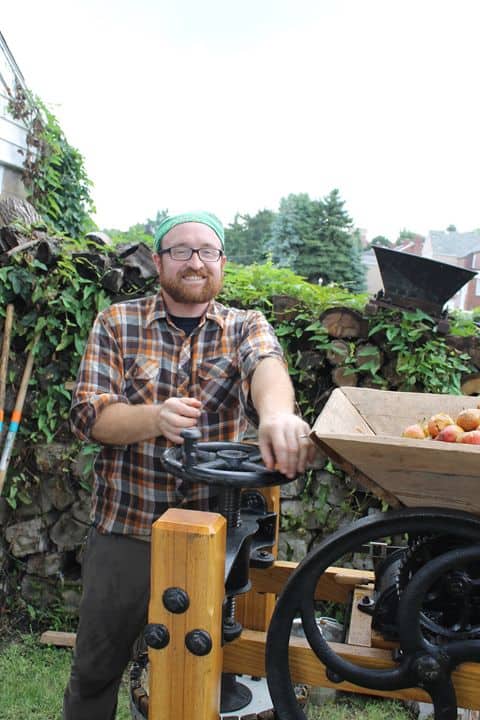
Sturges is also a community maker. In 2005, he and a few fellow cider enthusiasts started A Few Bad Apples, an organization whose mission is to utilize forgotten fruit for sustainable community cider making. Each fall, they harvest fruit that would otherwise go to waste, ferment it into delicious cider, then share it with others — free of charge — at community fundraisers, charity events and their annual cider festival. This allows them to donate to causes important to each of them while opening up a dialogue about topics like food waste, food pathways and sustainable agriculture.
Even the ciders they make help to advance this conversation. A recent blend used knotweed and raspberries to highlight the impact of invasive species on native flora. “These two plants play well together in the bottle,” notes Sturges. “But they don’t get along in nature.”
A core group of five or six self-described “bad apples” does the majority of the heavy lifting: harvesting, pressing, bottling and pouring. But, Sturges says, upwards of 100 people consider themselves part of the organization, and this is the real story of A Few Bad Apples. It’s about cider, but it’s just as much about community.
Every part of the group’s cider-making process — from sourcing to sipping — is optimized to build relationships, and it often starts with a knock on a door.
Apple trees abound in neighborhoods, parks and backyards around the city of Pittsburgh, often overlooked as sources of nourishment. These trees, unpruned and neglected, produce gnarly fruit that gives people pause. Is it safe to eat? Will it taste as good as the perfect red orbs in the grocery store? As a result, countless tons of apples fall from these forgotten trees each year, feeding only the yellow jackets and groundhogs. A Few Bad Apples is working to change this dynamic and to get people to trust food that grows right in front of them.
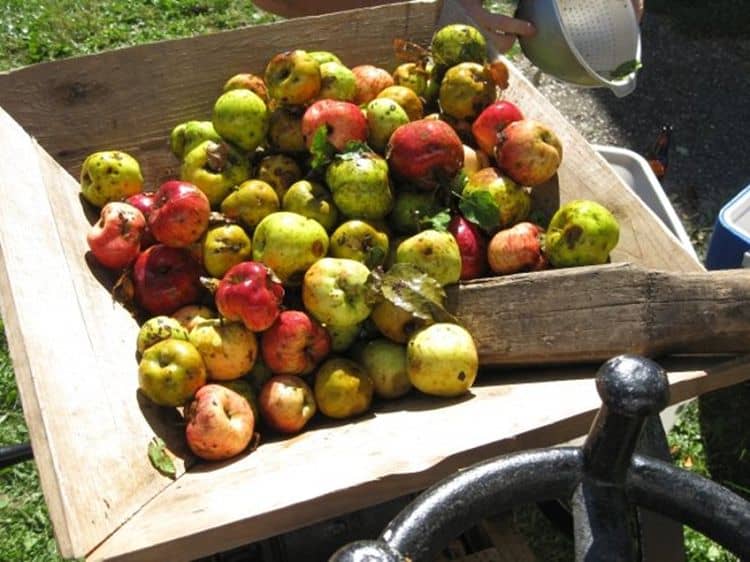
When he finds a promising tree, Sturges approaches the owner and asks two simple questions: Are you using your fruit, and if not, may we harvest it? Most often, the answers are, respectively, “no” and an enthusiastic “YES!” The majority of people are more than happy to allow A Few Bad Apples to harvest their unused fruit, with the promise of new life for their apples and a few bottles of the cider they are destined to become.
Sharing the harvest and the fruits of his labor are critical to growing relationships and trust. But, the organization doesn’t stop there. Members of A Few Bad Apples become caretakers, volunteering to come back in the fall and spring to prune and nurture (both the trees and the relationship) for the future. This past winter, they tended more than 100 trees across Southwestern Pennsylvania.
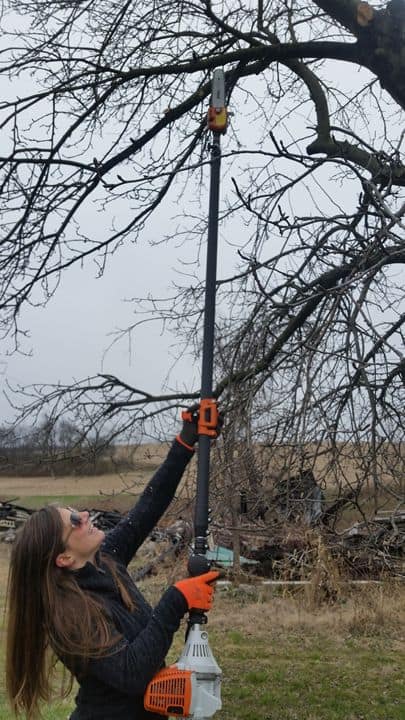
Pressing is another chance to engage the community in their mission. Sturges invites everyone involved in the harvest to his home where a 140-year-old hand-cranked press turns the ugly fruit into fresh cider. A recent upgrade to equipment — A Few Bad Apples has gone electric — has made the process more efficient and predictable. That old press, though, comes out for special occasions, providing a photo opportunity on pressing day (pictures of babies sitting on top of a pile of apples in the press is a particularly popular snapshot).
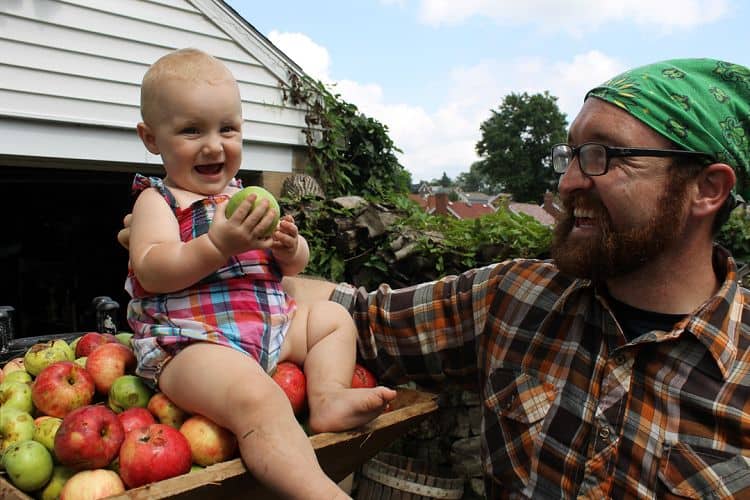
Parents bring children, who might sample freshly pressed juice for the first time in their young lives. Cider fanatics drag along cider-skeptic friends, converting the wary to true believers. Others who are interested in learning the craft of cider making bring their own apples to press. By engaging people in the process of turning something they’d believed to be useless and disposable into something delicious and sustainable, Sturges and A Few Bad Apples are changing hearts and minds.
Always looking for ways to reuse and recycle, Sturges incorporates the pulpy pomace from the cider pressing — skins and seeds and stems from up to a ton of apples from a large pressing — into the large-scale community compost program he maintains. Those spent and forgotten fruits bring life to neighbors’ gardens, completing the cycle of life.
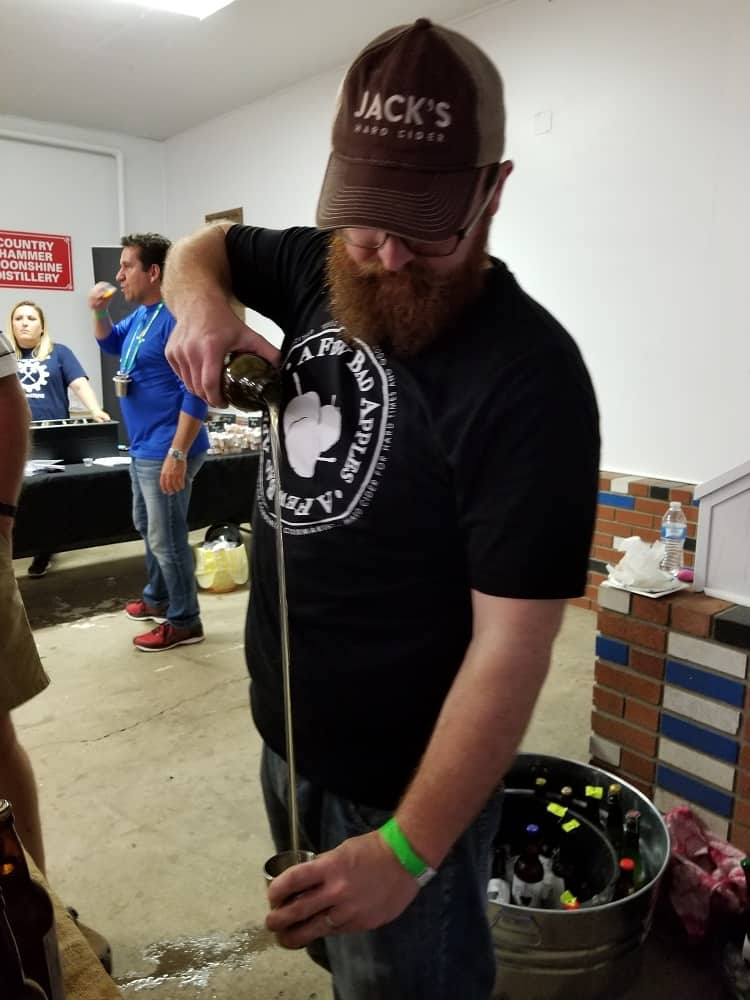
Over the last two years, Sturges has taken his craft to the next level, collaborating with Jack’s Hard Cider in Biglerville, Pennsylvania to produce a series of commercially available and experimental ciders. Currently pouring across Pennsylvania, Wylde Appeal highlights Sturges’ knack for squeezing a range of flavors into a glass. Wild fermented on 1,001 apple skins, then aged on French oak and in bourbon barrels, Wylde Appeal is surprisingly light and refreshing, with soft drying tannins from the skin contact. “It’s like bubbly Chardonnay,” Sturges notes.
New challenges are ahead: Recently, A Few Bad Apples started pruning a stand of long-neglected apple trees — untouched for five decades — in Pittsburgh’s North Park. The fruit from the next harvest in this orchard will become cider that is served at future fundraising events for the county parks. And while Sturges is kicking around the idea of opening a cidery in the future, for now he is happy making the ciders he loves on a scale that allows him to control the process from fruit to glass.
“Making and sharing cider enriches my life,” says Sturges, adding “It’s good for the soul.”
For more info about A Few Bad Apples, or to invite Sturges to harvest apples from your trees (if you are nearby Pittsburgh), email afewbadapplescider@gmail.com.
- Photos: A Few Bad Apples